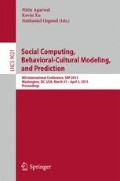Abstract
Massively-multiplayer online games (MMOGs) can serve as a unique laboratory for studying large-scale human behaviors. However, one question that often arises is whether the observed behavior is specific to the game world and its winning conditions. This paper studies the nature of conflict and communication across two game worlds that have different game objectives. We compare and contrast the structure of attack networks with trade and communication networks. Similar to real-life, social structures play a significant role in the likelihood of inter-player conflict.
Access this chapter
Tax calculation will be finalised at checkout
Purchases are for personal use only
Preview
Unable to display preview. Download preview PDF.
References
Roy, A., Borbora, Z., Srivastava, J.: Socialization and trust formation: A mutual reinforcement? An exploratory analysis in an online virtual setting. In: IEEE/ACM International Conference on Advances in Social Networks Analysis and Mining, pp. 653–660 (2013)
Yee, N.: The labor of fun: How video games blur the boundaries of work and play. Games and Culture 1(1), 68–71 (2006)
Thurau, C., Bauckhage, C.: Analyzing the evolution of social groups in World of Warcraft. In: IEEE International Conference on Computational Intelligence in Games, pp. 170–177 (2010)
Keegan, B., Ahmed, M., Williams, D., Srivastava, J., Contractor, N.: Dark gold: Statistical properties of clandestine networks in massively multiplayer online games. In: IEEE International Conference on Social Computing, pp. 201–208 (2010)
Korsgaard, M., Picot, A., Wigand, R., Welpe, I., Assmann, J.: Cooperation, coordination, and trust in virtual teams: Insights from virtual games. In: Online Worlds: Convergence of the Real and the Virtual (2010)
Wigand, R., Agrawal, N., Osesina, O., Hering, W., Korsgaard, M., Picot, A., Drescher, M.: Social network indices as performance predictors in a virtual organization. In: Computational Analysis of Social Networks, pp. 144–149 (2012)
Lakkaraju, K., Whetzel, J.: Group roles in massively multiplayer online games. In: Proceedings of the Workshop on Collaborative Online Organizations at the 14th International Conference on Autonomous Agents and Multiagent Systems (2013)
Lee, J., Lakkaraju, K.: Predicting guild membership in massively multiplayer online games. In: Proceedings of the International Conference on Social Computing, Behavioral-Cultural Modeling, and Prediction, Washington, D.C., April 2014
Alvari, H., Lakkaraju, K., Sukthankar, G., Whetzel, J.: Predicting guild membership in massively multiplayer online games. In: Proceedings of the International Conference on Social Computing, Behavioral-Cultural Modeling, and Prediction, Washington, D.C., pp. 215–222, April 2014
Drescher, M., Korsgaard, M., Welpe, I., Picot, A., Wigand, R.: The dynamics of shared leadership: Building trust and enhancing performance. Journal of Applied Psychology 99(5), 771–783 (2014)
Warner, D., Raiter, M.: Social context in massively-multiplayer online games (MMOGs): Ethical questions in shared space. International Reviews of Information Ethics 4, 46–52 (2005)
Humphreys, M., Weinstein, J.: Who fights? The determinants of participation in civil war. American Journal of Political Science 52(2), 436–455 (2008)
Bennerstedt, U., Ivarsson, J., Linderoth, J.: How gamers manage aggression: Situating skills in collaborative computer games. Computer-Supported Collaborative learning 7, 43–61 (2012)
Clauset, A., Shalizi, C.R., Newman, M.E.: Power-law distributions in empirical data. SIAM Review 51(4), 661–703 (2009)
Seshadri, M., Machiraju, S., Sridharan, A., Bolot, J., Faloutsos, C., Leskovec, J.: Mobile call graphs: Beyond power-law and lognormal distributions. In: Proceedings of the ACM SIGKDD Conference on Knowledge Discovery and Data Mining (2008)
Newman, M.E.J.: Assortative mixing in networks. Physical Review Letters 89(20), 208701 (October 2002)
Piraveenan, M., Chung, K.S.K., Uddin, S.: Assortativity of links in directed networks. In: Fundamentals of Computer Science (2012)
Author information
Authors and Affiliations
Corresponding author
Editor information
Editors and Affiliations
Rights and permissions
Copyright information
© 2015 Springer International Publishing Switzerland
About this paper
Cite this paper
Hajibagheri, A., Lakkaraju, K., Sukthankar, G., Wigand, R.T., Agarwal, N. (2015). Conflict and Communication in Massively-Multiplayer Online Games. In: Agarwal, N., Xu, K., Osgood, N. (eds) Social Computing, Behavioral-Cultural Modeling, and Prediction. SBP 2015. Lecture Notes in Computer Science(), vol 9021. Springer, Cham. https://doi.org/10.1007/978-3-319-16268-3_7
Download citation
DOI: https://doi.org/10.1007/978-3-319-16268-3_7
Published:
Publisher Name: Springer, Cham
Print ISBN: 978-3-319-16267-6
Online ISBN: 978-3-319-16268-3
eBook Packages: Computer ScienceComputer Science (R0)

